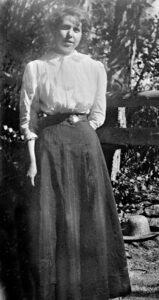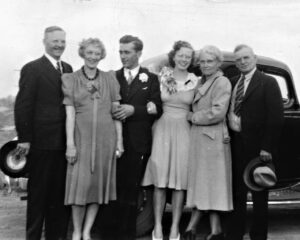[Editor's note: This series of posts originally appeared in Vita Brevis in June 2021.]
While recently reviewing family research that I have been doing for some time, I came to the realization that I had learned some valuable lessons during that process. These lessons are not unique to me, but the circumstances surely are. The first lesson relates to family stories.
The availability of online records has greatly increased our ability to find information from past generations, mostly in the form of facts and the information related to them. What it has not done, and can never do, is retrieve those family stories that have died with those ancestors. How many people have said “I wish I had asked my grandfather about...”? I am one of those who have lamented lost opportunities. We cannot make up for the past, but we can ensure that does not happen to the family stories that we have tucked away in our memories. Do not wait to be asked, record those stories!
*
To wit, here is a story relating to my parents’ marriage. Both of them grew up in Colorado: my mother was born in Denver and my father in Aspen. When they met and became acquainted, it did not take long for them to decide they were meant for each other. Marriage began to be discussed, but there was a problem. My father was a first cousin once removed from Mom’s mother, and they were worried that they were too closely related to be allowed to marry. My father’s father, believing in directness and not being much on finesse, simply took my mother aside and told her there wasn’t a problem at all: “You two are not related because your mother is not your real mother, she is your stepmother.”
I heard this story when I was very young and I don’t remember thinking too much about it. Looking back as an adult, I can’t imagine the emotional impact of simultaneous shock and joy this eighteen-year-old girl must have felt in that moment. While joyful that she could marry the man she loved, she simultaneously had to make sense of the disturbing and baffling news that the only mother she had ever known was not her real mother. No doubt this was followed closely by “What happened to my mother?” Mom was away from home when this all happened, and one wonders what transpired between daughter and stepmother when they next got together. Thankfully, all worked out beautifully as my mother continued to have a loving relationship with her stepmother throughout her stepmother’s life. My parents were in their seventy-first year of marriage when my father died.
My mother was two when her biological mother died of diphtheria. Her father remarried within a year and his second wife wanted Mom to think she was her real mother. Growing up, Mom never had an inkling of the truth, but she did remember occasional awkwardness when coming in on certain conversations. It turns out these conversations were related to her maternal grandparents, aunts, uncles, and cousins, then unknown to her, who lived some distance away.
After my parents’ marriage, they did not have opportunities to visit these unmet relations. The Great Depression was on and my father had just found a job which was located far enough away that they had neither the time nor the money to travel. After World War II, our family moved to California. Mom never met her grandparents, but she did eventually meet many of her aunts and uncles and some of her cousins. I am sure her later-life interest in genealogy was prompted in large part by her desire to learn more about her mother and her mother’s family.
*
My second lesson is that effort, persistence, and some luck can combine to pay very large dividends.
Continued here.
Share this:

About Philip Grover
Philip Grover is a retired chemical engineer who got involved in genealogy by helping his mother enter her extensive family research into Personal Ancestral File for Mac. Little did he know then what a slippery slope that minor involvement would become. After getting deeply involved in doing his own research, he realized how disinterested family members can be in genealogical charts, lists, and diagrams. His focus since has been making his family history more interesting and accessible, and toward that end he has self-published three books of family history.View all posts by Philip Grover →

